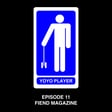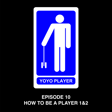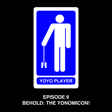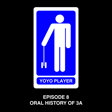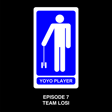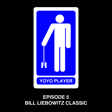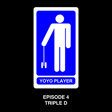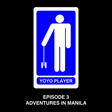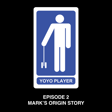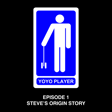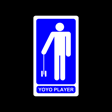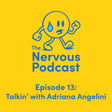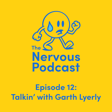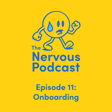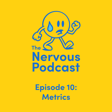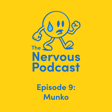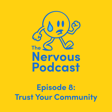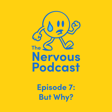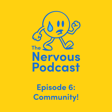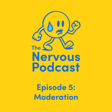Become a Creator today!Start creating today - Share your story with the world!
Start for free
00:00:00
00:00:01

Oral History of 5A
Steve and Mark sit down and talk through the beginning of 5A - how it started, what inspired it, and discuss the full starting history of this unique style of yoyo play.
Recommended
Transcript
Introduction to New Yo-Yo Styles
00:00:00
Speaker
I'm Steve Brown and I'm Mark McBride and this is a podcast about that time we made up two whole new styles of yo-yo play and at the time nobody cared and now a few people care maybe.
Creation and Impact of Yo-Yo Divisions
00:00:37
Speaker
How did you and I end up responsible for two entire divisions? Like it's still, you know, or like, wait, you did what? Like, and I, I really, it sounds, it still sounds like bullshit to me. Yeah. It's time and place in history.
00:00:53
Speaker
You know, it was, we were at the right time in the right place, man. Yeah. I mean, intellectually, I know that, you know what I mean? Like I can look back and be like, Oh, well, this is purely a timing thing. Like, you know, as I've said many, many times before, like it's easy to be creative and avoid, you know, like there's nothing, there's nothing there to base anything off of anything you make up as new, but it's still the fact that this, that it all stuck, the fact that it actually, like,
00:01:19
Speaker
you know, not that we created something, but that we created something with such legs is still really kind of mind blowing to
Birth of 5A and Breaking Conventions
00:01:26
Speaker
me. 5A started out of my desire to make Yoyo and bigger on stage. Okay. And that was, that was my primary motivator. Because if you remember at the time I was hanging out with a shit ton of jugglers. And also I will say this is also the time there was a real, we were coming out of a time when showy
00:01:47
Speaker
performance. People wear the teal shirts in 2A and that was the conventional school of thought like this is how you had to do yo-yoing and it had to look like this and then there was
00:01:59
Speaker
a handful of us more than a handful, but there was the kids table where I felt like the creativity was happening. And there was a real separation between the creativity and showing us. So it's really interesting that you were connecting those. I didn't even, I never even thought about that. Well, there was like, when I first started playing the conventional wisdom was that you would start out with learning one a tricks, and then eventually you would graduate to two way. Yeah.
00:02:27
Speaker
And I never liked that. I never liked that. And I hated that daikon. I hated the idea that 1A was only something you did until you got better. Yeah, I agree. You only did it until you got good enough to do 2A. And I didn't like 2A. I thought it was, I mean, at the time, like it certainly wasn't very interesting at the time.
00:02:48
Speaker
Like in fairness it is gotten way fucking cooler what's up shout out shoot to cotta you know to a has is has obviously grown tremendously but at the time like it wasn't very interesting and i was way more interested in one a.
Challenges in Yo-Yo Innovation
00:03:00
Speaker
And the, and nobody was, nobody was okay with that. I remember in 1996, 97 early 1997, um, you know, I got wind about high performance kites building out like this huge demo team of like touring yo-yo professionals.
00:03:19
Speaker
And Greg was like, Greg Cohen was like, dude, you should call them and see if you can get a spot on their team. And so I called Alan to go got him on the phone and was like, Hey, I understand you're putting together a yo-yo team. I'd love to be considered for this. There's like this pause and he was like, so can you do two handed shoot the moon? Now at the time, like eight fucking people could do two handed shoots. Oh yeah. That was, that was like insane.
00:03:47
Speaker
Yeah. So it was a dick thing to ask. Right. That was like, that was a straight up, like, I want to get off the phone with this fucking kid as quickly as I can. So I was like, no, I can't. I'm primarily a one handed player. And he was like, Oh, we really need two handed players. Are you not good enough?
00:04:07
Speaker
And I was like, it's not a matter of being good enough. It's a matter of, I think that one a is a more interesting style. And I prefer to focus on that. And I think that it's just as difficult if done correctly, because, you know, I'm still in job interview mode at this point. I'm trying, I'm trying really hard not to be like, how about you go fuck yourself, dude?
00:04:32
Speaker
He's like, well, we're really looking just for, you know, talented two way players. So, you know, if you can do two headed shoot the moon, give me a call click. And that was one of those, that was one of those great moments in my early yo-yo career where I was like, I'll show you motherfucker. And that was, that was a hundred percent. I mean, you know, the, the degree to which my life has been motivated by spite is probably not healthy, but also singularly impressive.
00:05:02
Speaker
Hey, you know, like again, they it's, uh, whatever works, man, whatever works. So I was like, that was that moment where I was like, I'm, this is the fucking hill I'm going to die on. Like I'm going to make one a look amazing on stage and it's going to be bigger and cooler looking than two way.
Influence of Alex Garcia on Yo-Yoing
00:05:21
Speaker
Now, I think that I'll jump in and give a little context again. So this would have been, this is 98, 98 going into 99.
00:05:30
Speaker
Um, and at this point in history, you had, uh, Alex Garcia, which man, when we started, he was like, he was the guy. Yeah. 1997, like 1997 world yo-yo contest was at the IJA festival in Pittsburgh. And that was the first time that we saw THP.
00:05:51
Speaker
Okay. That was the first time we saw the teal tide on stage. And it was just, I mean, it was kids, like we were all like in our early twenties at this point.
00:06:01
Speaker
And these were like fucking kids. These were like 10, 11, 12 year old kids getting on stage, playing two handed with Raiders and just ripping shit up. Yeah. Yeah. And it was, it was super impressive, but it was also, they all played exactly the same except Alex. Yeah. And Alex stood head and shoulders above the rest of them. Alex had,
00:06:23
Speaker
like this really incredible like on stage kind of persona. He had a real sense for like how to perform. His personality really came through like, you know, there was that moment, I want to say it was 98 nationals when he was doing that, that routine to that dodo song. And there's this moment where like the music goes, and he like, he kicks the yo-yo back and he looks out and he like raises an eyebrow.
00:06:50
Speaker
you know, pops an eyebrow up like full on like the rock style. And it was like the whole crowd just went just like everybody just went fucking bat shit for it. Like that had worked the shit out of a crowd. And for a few years there during like the height of that yo-yo boom, like he was a star like a legitimate worldwide star. Like he was absolutely star.
00:07:14
Speaker
he would show up for like demos in Japan and there would be 10,000 kids waiting to try and get his autograph. Like it was that level of batshit crazy. So this, you know, this is the backdrop that I was trying to figure out a way to make one a bigger and cooler against.
00:07:30
Speaker
And I remember that he, at the time he was doing, um, he started doing some like slippery eel moves. Like I remember somehow Cliff Coleman was really into slippery eel, but Alex Garcia made it look good. It was doing, like he started, like when he, when he started doing the slippery eel stuff, I went,
00:07:47
Speaker
Oh, those are, those are tricks that are look good. Well, and he did it as a closer, right? So what he did is at the very end of his routine, he took the slipknot off of his finger. He threw a trapeze, pin wheeled it around, brought it under his right leg and then kind of, or yeah, I did like brought it under, brought it under his leg and did kind of like a leg switch thing. So it was like right leg.
00:08:10
Speaker
under the left leg and then he like pivoted it so that it went behind his back and then he would shoot the yo-yo, he would release the end of the string, shoot the yo-yo straight up in the air and then boom, rocket to the pocket. It was a baller fucking move. It was really amazing like routine ending move.
00:08:27
Speaker
But that's because he had taken the year off his finger and there was no way to get it back on like it was once it was off your hand it was fucking done in the physics of it was that the the Friction of it sliding across your leg
Innovations with Beads and Tricks
00:08:41
Speaker
your waist your arm kept The string from going back in which it normally would have because again, these are the days the response of yo-yo so typically when you would do the rock in the pocket you take it off your hand throw it up and then as soon as you let go the string go and
00:08:57
Speaker
It's right back in and it falls in your pocket. But the fact that he would like slide it across, kept it out so that he could do like multiple moves. He could catch the string as it slid across, you'd grab it, and then you could do another swing and spin and drag it across your arm, your leg, whatever. And you could keep it going rather than just up and out.
00:09:18
Speaker
Right. So, and it was still pretty limited and it was definitely like it was a closer trick. Yeah. But I was fascinated with this. I was like, Oh, this is, this is next level shit. You know, like, how do we, how do I, how do I, what else can I do with this? Because again, like I wanted to make yo-yo and look bigger because I was, you know, like all the yo-yo contests were at juggling festivals. So I was going to these juggling festivals. I was hanging out with yo-yoers like 10% of the time.
00:09:46
Speaker
The other 90% of the time I was hanging out with jugglers, everything they were doing was bigger and looked better. Yeah. And I was again, going back into that mod and how can you make it better, different, easier? Like I remember when I was trying to do it, I'd be like, yeah, it goes through. But the problem was is that it would slide right through your hands. So I had the idea. I was like, Oh, I'll get a little bead.
00:10:11
Speaker
put a little bead on there just so that I had something to hit and grab to make the knot functionally bigger. I went to a bead store in Los Angeles and I got these little beads that I thought you could hook through and they were just little hearts. They were little heart beads that I thought that you could hook through and would hook on the string
00:10:31
Speaker
So if you put it on your finger, but yeah, it would still be like grabbable for slippery eel stuff. Right. I mean, they were tiny. They were super, super, super tiny. They were like little tiny plastic beads that were probably like, I don't know, two or three millimeters wide. I still have that bag of beads somewhere. Are you serious? Yeah. Oh my gosh. I got to go dig them up. I'll dig up there. There are the original
00:10:53
Speaker
bag of beads that I purchased at the bead store. Cause again, you have to buy them and you can't just buy one bead. You buy like, you know, a scoop of beads, right? I know. I, you know, I recently bought,
Discovery of Counterweight Play
00:11:05
Speaker
uh, I recently bought a sack of them to sell with the counterweights in my store because some people were asking for them and I was like, I'll get like a little bag of, no, I bought a bag of 500 for like $2. So yeah. So the, the, the original, the original beads that I gave, I had a bag of them.
00:11:22
Speaker
And you'd come out to LA and I was like, Hey, I got this beads here. Have a bead. No, I don't think we were in LA. I think you were in Florida because I distinctly remember.
00:11:34
Speaker
this whole conversation happening between the two of us at the Groundhog's Day juggling festival in Atlanta for some reason. No way, was it? I think you were visiting and you had given me like a little, and it was a little pink plastic heartbeat. And like, you know, and I was, I was talking, I was talking about all the slippery ill stuff, like non-fucking stop. Like I would not shut up about it. That adds up of you talking your shit and people are like, I got a bead.
00:12:02
Speaker
Yeah. Like, I mean, I couldn't stop talking about it and I, and I was also supremely frustrated because I was terrible at it. Like it was not clicking for me for whatever reason. Again, I got a beat that might help you with that. And to like here, take this bead that way, you know, like you've got something to kind of like catch on your fingers because the knot was just sliding right through my fingers. Yeah.
00:12:24
Speaker
And, uh, and I was like, yeah, cool. You know, I'll try that out. And I just, I, I wasn't even playing yo yo at the time. I was like working on juggling at that moment. I just took the bead through it in my pocket, like, you know, and, and was like, yeah, yeah, I'll try this out later. Uh, I absolutely lost that bead like fucking immediately. Surely it went into my pocket that day. And you know, by 10 o'clock that night, it was completely gone. Um, so, you know, after the juggling convention,
00:12:52
Speaker
Like I spent a good chunk of time at that particular festival hanging out with Jay Gilligan, uh, who's a juggler that I've been friends with for a really long time. Absolutely amazing juggler. Tremendous person. Um, one of the most creative, like just singularly creative people I know. Um, also probably the single largest influence on my yo-yoing. Really?
00:13:11
Speaker
Yeah, dude's never thrown a yo-yo to my knowledge. Um, but like his juggling and his approach to creation and creativity is like probably my single largest like creative influence for yo-yoing. And so I'd been hanging out with him a lot and I went back home.
00:13:28
Speaker
and was like, I need to figure out this whole like slippery hill thing. I, you know, I couldn't find the bead and I just kept messing with it and kept messing with it and was just not getting anywhere with it. But in the meantime, I was trying to develop like, you know, how much bigger could I do tricks? And so I was focusing really on like very large circles, you know, like what could I do with like big around the world and then do something interesting with it. Um, so this was 1990. I can tell you it was before 99. It must have been,
00:13:57
Speaker
This was 99. It was 99 because I was already working for Team Losy at this point. Yeah. But it was before, it was before BAC 99 because I remember that.
00:14:07
Speaker
is of consequence. And we'll get to that. Well, this was like late 1998, early 1999. I was already working. So 1998 at the World Yoyo Contest, Team Losi came out to watch me compete. And then that is where I got sponsored. So it was, you know, latter half of 98, early 99. I was, you know, just working hard at trying to figure out how to make all of this look bigger.
00:14:32
Speaker
And I went, I went looking for, I was like, Oh shit, Mark gave me a B. Where'd that bead go? I went looking for it. Well, hold on. We know if it was Groundhog's Day, that would have been February. So that must have been, so that would have been February 99 because it was before May
Counterweight Routine Breakthrough
00:14:48
Speaker
99. So between February and May of 99. Wow. Or was it February of 98? No, it was because it was after
00:14:59
Speaker
I didn't bother like, cause it, I got the, I was doing that stuff when I was a pro with the Omega and I didn't start with the Omega until summer 98. Okay. So I guess it would have been February 99. Wow. We're narrowing it down. Forensics. So February of 99.
00:15:20
Speaker
uh, we're at the juggling festival. So then, you know, not long after that, I am out in California working for team Losi doing demos for them. And, um, there was these couple of yo-yo players, Mitch and Paul, I think it was Mitch and Paul. Yeah, they were, they were, they were like golden apple regulars and I'm embarrassed that I can't remember Mitch's buddy's name. I'm so embarrassed.
00:15:45
Speaker
I think it's, I think it's Paul. I could see their spiky hair, like that very, very late nineties, spiky hair. Um, but they were, uh, yeah, they would hang out with me whenever I was in California out doing like team Losi stuff. Um,
00:16:00
Speaker
And at one point, one of them gave me a wallet chain that was like, you know, like the little beaded chains. Yeah. It was like a, it was like a fat, like a fat version of like a beaded chain. Um, and it had like two canceled casino dice that had been drilled out and like strung onto it, you know, because it's late nineties and you know, everything needs to look like.
00:16:19
Speaker
You know hipster e wallet chain dice rockabilly swing like it swing was dying and. You know that vegas culture yeah it was that you know like coop poster kind of like. Like nouveau hot rod bullshit kind of.
00:16:38
Speaker
So they gave me this wallet chain. I was like, Oh, that's rad. Thanks. And, you know, and I immediately like clipped it onto my gigantic clunky fucking leather wallet that had like dice stamped into it. Like, of course. And, and so I was wearing like this wallet chain. And so I remember being back home in Tallahassee and like trying to like really.
00:16:56
Speaker
you know like Bay Area Classic was coming up like you know I just I really wanted to do something to kind of like push my play forward and so I was really I was really stuck on this fucking slippery eel and the thing that was epic I got like man
00:17:11
Speaker
Barry Classic, BAC 99, arguably one of the greatest, if not most important contests in yo-yo history. One of the things about it was that that was the contest where Dave Bazan, who put it on, had a pro-invitational division.
00:17:29
Speaker
So all these other contests, you would have to do preliminaries and you'd get up there and kind of like you had to work your way up. But Dave said no. There was still that contest. There was still that contest. But he reached out to what he thought was like the cool, you know, like a set of exciting pros and said, we're just having an invitational division. Paul Hahn won and he got $500 and that was the most amazing, like that was just like mine or was it thousand? It was like, it was money. Oh my gosh, there's money in Yo-Yo.
00:18:00
Speaker
Of course, Holohan, THP, so it was Alan Agao giving himself money back. He got Chris Neff up there, which to this day is still one of my, I wish that there was record of that. Chris Neff, BAC99, was insane, creative, interesting, long string, cool, free, oh gosh, routines. I'm trying to remember all the long string stuff. That came out of style.
00:18:25
Speaker
Well, you know, because we tried playing with it for a little bit, but Neff was the only one that, but Neff brought it up on stage and did some like, it was cool stuff. It was the only, it was the only pro, it was the only contest that I've competed in. Like the only time that you see Mark McBride up on stage. And of course I was ridiculous. I had, I had costume changes. I think I at least had a goofy hat. You had an orange Star Wars blaster and a cowboy hat. Yes.
00:18:50
Speaker
And in fact, the photos, like photos from that we ended up using as like promo shots for the Fiend tour just to mock me the ridiculousness. I loved it. So anyway, so this was something that we didn't know how great it was going to be, but we knew.
00:19:04
Speaker
then we bothered and we had to make routines for it. Like I actually bothered to make routine. Like you were working on a routine. Yeah. And so I was really desperately trying to figure out how to dial in this goddamn slippery hill stuff. And I was not, it was not working for me. And I was out at the lofty pursuits shop, uh, after it had moved off of Tharp Street and, uh, to Lake Ella, which is like right at the end of Tharp Street.
00:19:28
Speaker
Um, it moved like a half mile away. Uh, and I remember I was at that shop and I was, I was literally like rummaging around through all the drawers and everything, looking for something tiny that I could tie onto the end of my string. Um, because I had lost the beat and I saw, like I looked down at my wallet chain and I saw the dice and I was like, Oh, I can pop one of these off. So I like.
00:19:52
Speaker
you know, popped one of those off and it was way too big for what I wanted. Um, but I was like, whatever, I just need to figure something. I just need to figure it out this trick. And I was like, I was in like this weird, like kind of manic, hyper creative, like I have to do this now, like mode. And so I, I tied the dice on the die onto the end of the string. And I remember I threw a trapeze and, uh, I sneezed.
00:20:15
Speaker
Like I was, I was standing outside, like I was standing outside and like, I'd never had allergies in my life until I moved to Tallahassee, but Tallahassee is it like the nexus of like five ecosystems. So everybody in Tallahassee has allergies. So I remember I threw a trapeze and as I threw it, I sneezed and I dropped the dye and my yo-yo was just unresponsive enough.
00:20:40
Speaker
Cause remember we were all still playing responsive at this point that the dice swung around and then slid down my left hand so that I, and I kind of caught it just sort of reflexively, like juggler reflex just caught the die and was just holding a left-handed sleeper. No way. And I was like, what the shit?
00:21:00
Speaker
And so then I like, I moved it back over to my right hand and caught it. And then I threw a trapeze and then I dropped the die again and just let it swing around and then catch my left hand. Boom. Left-handed sleeper and then caught the yo-yo awkwardly left-handed. And I was like, shit, this is like a, this could be like a thing. Then it became like, well, how do I, like, what do I do with this? Like, how do I, the thing that the change here, the physics to be sciency for a second,
00:21:29
Speaker
Everything that we'd be done like the bead, the slippery eel, that stuff was the weight of that was underneath the responsiveness of the yo-yo. So it had no trick effect. So what happened with you was the line that got crossed was that you started
00:21:47
Speaker
the die was heavier than the response of the yo-yo, so it held the string out. That was the change. That was the event horizon that was crossed. You were using stuff where when you took the string off your finger,
00:22:06
Speaker
it didn't get pulled straight into the yo-yo. It enabled this. So that was really the line being crossed into this new world. And so for me, like the very first struggle that I had to get past was that regardless of whatever I was doing with the die, I still had to figure out a way to overcome the responsiveness of the yo-yo.
00:22:27
Speaker
Like the yo-yo was still going to snap back to my hand, like relatively easily. So whatever I was doing with the die, I had to figure out how to maintain that string tension so that it didn't get loose and then immediately want to snap up. And so, you know, I kept kind of messing. My first thought was to basically just make everything ambidextrous, right? Is that, you know, now I can do everything left or right handed because I can easily quickly pass the yo-yo between my left and my right hand.
00:22:56
Speaker
So the very first thing that I started doing is I threw from, you know, my normal, like right hand, I threw a trapeze, popped it off of the string. And as it came off the string, I slid the counterweight around to my left hand and then caught a trapeze opposite handed. And so I would just trapeze back and forth, back and forth, back and forth. And, you know, it was pretty short sighted initially. Like I didn't, I didn't immediately see like the actual possibility of it. I was just like, Oh, I can do everything on both sides now that
00:23:26
Speaker
inherently makes all of my tricks look bigger. So I just, my first thought was like, okay, cool. Now, how do I make, you know, I can make, now I can make trapeze look fucking huge because I can do it all the way across my body in two completely different directions. And then I was like, I was going to do around the world and then switch it to my other hand so that I could go around the other side of my body, you know, and I was doing it around the world.
00:23:48
Speaker
And I, I just let go of it. And I don't know why I let go of it. I didn't do it intentionally, but I didn't do it accidentally. It was just one of those things where I, you know, like you ever watch yourself make a mistake in slow motion and you're like, why are you doing that? Yeah, it was one of those moments.
00:24:06
Speaker
I've seen around the world and I just, for whatever reason, just looked at it and I just let go of the dye to see what would happen. And it just went up in the air, made a perfect continuous circle. And then the dye came back down in a way that I was able to just catch it easily. And then I went right into like a bottom out for brain twister.
00:24:24
Speaker
And I just stood there and like held it for a second. And I was like, holy fucking shit. And so that was the point where I started realizing like, wait a minute, I can like completely let go of this. So then I spent like a week just doing aerials.
00:24:39
Speaker
Like, yeah, that was it. That was all I was doing. I was trying to figure out, like I would, I would do aerials just straight from the front. I would do, I was trying to do like juggling moves. So I was trying to do like shoulder throws, you know, like back crosses, you know, I mean, that was everything is I was, I was just trying to mimic juggling in any way that I could.
00:24:59
Speaker
with this counterweight yo-yo, but I didn't want to show anybody yet because I wanted to debut it at Bay Area Classic. I can't remember if it was when you came out ahead of Bay Area Classic, but I remember the point where you showed it to me.
00:25:16
Speaker
And it was super top secret. It was don't show anybody this. You must've come to Tallahassee because when I showed up for BAC that year, I literally got off the plane and went straight from the airport to the contest. Maybe that was it. There was some, but I can't remember.
00:25:35
Speaker
But I remember there was like an hour when I got there, there was like an hour or two before like the actual competition started. And so I may have like taken you aside and been like, dude, check this out. It might've been that. It might've been that early there. But I just remember ahead of you showing everybody and I thought that it was, I felt like it was the night before or something like that.
00:25:55
Speaker
I mean, again, I believe you as far as, but I remember there being this kind of like, you had given me wind of it and you taught it, you know, and like showed me it. And I was just like.
00:26:07
Speaker
Oh yeah. No, Steve's got some cool shit. You know, this is going to be a good contest, but like, but it was, I mean, and I didn't have much, like I went back and I rewatched that like original routine again. And I, I seriously had like seven, maybe eight counterweight tricks
Duncan's Role and Industry Challenges
00:26:22
Speaker
in there. Um, but I had the aerial, um, I had like a variation on nunchucks.
00:26:28
Speaker
Um, you know, I had like a couple of kind of like key foundational tricks and, and I was so excited to like show those off on stage. I picked a song that I was really stoked on. Jesus built my hot rod by ministry. And I had that, I had that red t-shirt with the role model iron on that I had made. Um, because again, I was working on my branding and, uh,
00:26:54
Speaker
And I just remember like getting on stage and being like absolutely fucking terrified in a way that I had never been scared on stage. Like I always get nervy on stage. Like when I was doing theater, you know, you have like that, you know, that kind of initial like jitters and everything, but this was like totally different. Uh, this one, it was, it wasn't outdoor counts. It was an outdoor contest. So I felt like people were up and down. Like there was, there was an element of danger just to the competition part.
00:27:21
Speaker
Yeah, it was an outdoor contest. So it was like, I mean, if you've got a gust of wind, like you're fucked, you know, and that was kind of like the ongoing, like that was part of the ongoing peril of BAC, right? As it was just like, hope you don't get wind, pal. Good luck.
00:27:37
Speaker
But I remember getting up on stage and, you know, I had, I had actually like kind of mapped my routine out. I had a handful of like key things that I knew I specifically had to hit. And I remember the moment when I threw that aerial and caught it.
00:27:56
Speaker
Because over the audio from the sound system, I very clearly heard Dale Oliver who was judging. Yeah. I very clearly heard Dale Oliver go, what the fuck was that?
00:28:13
Speaker
And it was like, and that, that was the moment where I was like, I fucking got this. That's awesome. And I did. And I won. I won with that routine. Like nobody had any idea what the hell was going on. Um, nobody had ever seen a yo-yo move like that. Nobody had ever seen a yo-yo do that. And, uh, did you win or did Paul Hanwin?
00:28:34
Speaker
That was that different division that, so I won BAC three years in a row and it was 99, 2000, 2001 99 was because I debuted freehand. 2000 was like a, just a really solid, like refined, you know, definitely a more mature freehand routine. And then 2001 was blindfolded. Okay. Okay. Then it must've been a different routine to Paul one that year, or I'm just off my game.
00:28:59
Speaker
I think Paul just won the 1A division. Yeah, I think you're right. I think you're right. Yeah. I don't think it was the pro invitation. It was just the 1A. Cause you know, I mean, Paul Hahn, fucking Paul Hahn dude. At that time, like he was unstoppable. Yeah, he was. Um, you know, he was just one of those guys that like, if he felt like showing up that day, he could win that contest.
00:29:21
Speaker
Yeah. So at this point in the story, though, we're laying out and we're announcing warp tour because this would have been May of 99. Right. So photos like photos of us from that contest are, we used those as promo pictures for the warp tour. Yeah. And there, um, I had, I had moved from your mega to just kind of being like a fiend guy and was being, but I hadn't been,
00:29:51
Speaker
I hadn't really connected with Duncan yet at that point. Andrew Artisan was still just kind of coming in. So I actually was like, I was, I was actually throwing, um, Losi's at that contest. And so Duncan hadn't, Duncan hadn't picked either of us up at that point. Yeah, I was still, I was working. That was the year I was working for team Losi. Um, I was using, uh, I was using silver series cherry bombs.
00:30:21
Speaker
because they were the heaviest, it was the heaviest ones that we were making. Um, and they were shiny and chrome. So, you know, it was like, fuck yeah, 1999 chrome. So how did they, how did you get from, cause Duncan really embraced freehand and you like, what was the transition from, what was that transition? So right at the very end of 98 is when I got picked up by team Losi and I only worked for them for a year.
00:30:52
Speaker
Yeah. Um, so by the time BAC hit like we, I mean, basically like I got through warp tour.
00:31:01
Speaker
And, um, while I was on warp tour, I got an offer letter from Duncan. So it was not long after warp tour that I went to, that I went over and started working for Duncan, but something else, something to keep in mind about like this particular moment in counterweight is I was using, so I was using these like casino dice, right? I practice, I, I worked out.
00:31:26
Speaker
I spent like three weeks using these casino dice before I realized that I could file the corners down. It took you three fucking weeks to figure that out. I thought I just needed to catch it more carefully.
00:31:44
Speaker
How fucking that's how like tunnel vision I was My hands were so shredded there was just like red dots all over my hands So for our listeners at home that don't understand what we're talking so casino dice and an attempt to keep people from cheating or like edging, you know dice they are
00:32:08
Speaker
Perfectly cool. Like they're perfect sphere or not spheres cubes. They're like hard edge cubes and they're the sharpest machine. So the idea is that if you, so that like, if somebody tried to file like the, the corner to make the six come up or something like that, you would see it. So to prevent, uh, cheating, they are perfectly sharp. They are sharp as fuck.
00:32:36
Speaker
And yeah, and I spent like a full three weeks just being like, man, I'm gonna have to, I gotta be so careful about the way I catch this and catch it. And then at some point it like dawned on me and I was like, you dumb bastard. And I literally, I remember kneeling down.
00:32:50
Speaker
and just rubbing the corners on the concrete on the steps in front of Rocky Pursuit and just like grinding them down. And they're like, Oh, well, this is so much better. And then the other end, you know, not to jump ahead, but when you went over to Duncan, they
00:33:08
Speaker
got you and Chris Neff because I was, again, I'm going to go work in Hollywood. This Yo-Yo thing isn't my thing. Instead of it being McBride and Steve, it was McBride and Neff, which God bless the creativity that came out of it, of Chris Neff stuck in an RV having to do tours by himself. He had embraced it. He started making counterweights out of bounce balls and really playing with it.
00:33:38
Speaker
Yeah, he did. He made his own bounce ball counterweights and he would do like a walk the dog and then throw the ball forward and do a 360 spin with his body. So the ball would go forward, hit the ground, bounce back, and then he would spin and catch it. Like he was doing some crazy and he was, he, that was when he built the apparatus.
00:34:00
Speaker
Yes. The apparatus was basically like a handle was like a two pronged like wooden fork kind of deal that he would, he could either, you could either hold and use it as in place of your hands to do like weird, complicated tricks with, or he would mount, he had built like a PVC mount for it. So, you know, at the time
00:34:23
Speaker
We were you know, we were all about like doing external tricks, right? Like I would do that was the that was the time when It still seemed wacky to do handrails like I would throw I throw like Trapeze over handrails or I was having fun like it bar stools again trying to impress people like you know in bars Where you'd have a bar stool and throw over one and then you could do like under mount over mount over mount over mount kind of thing And again, that was like oh, it's a bar stool trick
00:34:50
Speaker
Fucking neff who's an architect is like no let's really do this. Yeah he built the whole apparatus like mounts and structures and at the time like we were doing like i was doing wallies do you remember that no i would do i would throw an aerial against the wall so that the yo-yo and the weight hit the wall at the same time.
00:35:11
Speaker
and like came back. We were such aspiring skaters. We were literally like, we were like, how do we make Yoyo look more like skating? We're like, oh, let's literally fucking mimic it. So we were doing like rail grinds. You know, I was like, we were throwing them off of walls. That's why in the Yonama con grinds like that, like the idea that you could put your like,
00:35:35
Speaker
You could put your yo-yo on anything whether you know it like walk the dog didn't have to be walk the dog you could walk the dog across the back of a chair this that inside what we got is cries cuz we were just aspiring skaters and there's there's so much of that in like the early don't get videos in the city roms and stuff that we did like us shooting an offstring yo-yo down like you know like a forty step handrail and then catch somebody catching it at the bottom like stuff like that.
00:36:00
Speaker
But so that was, you know, that, that was what I would, I would, again, cause I wanted you to be bigger. So it was like, how much bigger can I make it? Um, so I was doing all that with counterweight and then part of why I went over to Duncan is because they offered to pay for the patent, which I couldn't afford and Lucy wasn't interested in. Nice. And they were, and Duncan at that point was getting hip to, we were making videos. They were like Andrew Arveson at the time was,
00:36:28
Speaker
hip to the idea that the IP of doing interesting stuff was, was valuable. It wasn't just the plastic that you were putting out there. Right. So our friend Andrew, uh, was working as the marketing and promotions coordinator for Duncan at the time.
00:36:43
Speaker
And he was, he was just a little older than I, he was like Greg's age. He and Greg Cohen like went to college together. Um, and which is how we knew Andrew. And he was one of those people that like, you know, he was just a big old dork of a dude. Um, he got it.
00:37:01
Speaker
He understood. And even if he personally wasn't cool, he instinctively knew what was. And it was one of those things that he understood if you make cool videos and you have cool people, the yoyos will just fucking sell themselves.
Developing Yo-Yos for Counterweight
00:37:20
Speaker
Um, and so he was, you know, he was very visionary in that regard that like he understood this, uh, so much earlier than anybody else at the Duncan organization dead. And understood it earlier than any of the other yo-yo companies. I mean, at best you had Alex and like, I think the, I think Alex Garcia being aspirational was the only thing he like Duncan was when they're like, Oh no, this could be like different can different has value.
00:37:49
Speaker
Yeah. Like tight team, high performance got it right. They got it in the, in the regard of like, you know, making the yo-yo players themselves like personalities and making them aspirational. And then some of those based off of that personality.
00:38:04
Speaker
Alex had personality. He did. He did. But I mean, it was, it was hard for them to do that with these kids because they were still kids. And they didn't diversify them. They were all just like, you're, you're, you're, you're, you're just great. You know? So they, you know, they were going for like technical skill and they weren't, they weren't necessarily looking for personalities. A few of the stronger personalities kind of rose up out of that. They did.
00:38:29
Speaker
They did. Absolutely. You know, I mean, like Paul Hahn came out of that and A-Brooke was in there and she stood out because she was she was older than the rest of them and had already been a yo-yo performer for a while. Yeah, she actually had performance like chops. Yeah. But, you know, like a handful of them, like the personalities came out, but it was actually was like, hey, let's patent this. Let's do something different. And that's right. And so and for me, like that was exactly my mindset at the time, like that that fit in.
00:38:59
Speaker
perfectly with like what I was aiming for and what I was trying to do. So I worked with Duncan and allowed them to, and I didn't know shit about IP. I didn't know shit about patents.
00:39:10
Speaker
Uh, I really wish I had looking back, but obviously, you know, hindsight's 2020 and all that. So I assigned, I allowed them to patent it and assigned the patent exclusively to them. So my name was on there as an inventor, but they owned the patent and that will become important later. And then, you know, the very next thing at that point was to start making a yo-yo that was specifically good for. Counterweight for freehand play, as I was calling it at the time.
00:39:39
Speaker
So we were calling it freehand. Um, and it was, it was literally, we were calling it freehand play because, um, technically both of your hands were your freehand. Yeah. And that came out of the designation with the Yonama con where.
00:39:58
Speaker
under the idea that you people you had right and left like so many of the old things they'd say like you have your right hand then your left hand we're like yeah but that's not true for it's not true for left-handed players so you know going back to that kind of mathematical neutrality right
00:40:19
Speaker
Right. And so, you know, you were using, you had moved to the terminal that you had gone from left and right to throw hand freehand. And then what I was doing, technically your, both of your hands were your freehand. So I just started calling it freehand. Yeah. And so then I started working with Duncan to try and develop a yo-yo for this specifically. And at the time, Duncan did not have much of anything that was worth using in their product line, but what they did have,
00:40:46
Speaker
was the wheel, which is a pretty good shape. And it was a little bit heavy. It was heavier than the butterfly, both because of the side caps and just the general design of the yo-yo. And then we had multiple people who were modifying them to put bearing guts into them. And they were, that was a legendary mod. Like, because at the time you had all of your bearing yo-yos
00:41:14
Speaker
were obviously the raider was the big one. And I don't remember when the saver raider shipped, you know, and then you, I guess again, we mentioned the wing force was technically a butterfly yo-yo, but it really was narrow. It was very narrow. So you, like, you did not have a wide string gap bearing yo-yo. I mean, I think BC might've had one of theirs, but even those, I remember them being not as wide. The renegade, even the renegade, which at the time was like the, the, you know, the string trick yo-yo of choice was narrow as shit.
00:41:44
Speaker
Yeah, so that just contributed to the legend of a bearing wheel. So basically, there was a guy up in Massachusetts named Stan Zigo, who was doing really nice wheel parts. Such good stuff. He was great. And what I was able to do is I was able to convince Duncan
00:42:06
Speaker
because they were still they were still manufacturing a lot of the stuff like low like in like ohio and in indiana so they i was able to get them to run polycarbonate.
00:42:19
Speaker
through the wheel molds, just like a batch, like a test batch for me, although the wheels at that time were made out of K resin, which is like the cheapest shittiest. I mean, it's basically what they make tackle boxes out of. Like it's fucking it's trash plastic. And the idea is that it's, you know, it's meant to just be like cheap and easy to work with.
00:42:38
Speaker
Uh, polycarbonate is fiddlier and more difficult to work with, but it's also a hell of a lot stronger and a bit heavier. So I was able to get them to run, uh, polycarb through the wheel mold. And then I took all of those halves and I shipped them off to Stan.
00:42:54
Speaker
No way. And I was basically like, you know, here, I've got enough parts to make X number. I'll just pay you in parts. Like you can keep however many you need and then you can make those and keep those for yourself or sell them or whatever, but then send the rest of them to me and I need to use these.
00:43:11
Speaker
Yeah. And so then, you know, like I gave I basically like whatever I got back, like I just sort of split with Neff. And then that was what we were demoing with. No way. Yeah. So a lot of like the early five a development from that time period that was all done on polycar bearing wheels, um, hand modified by Stan Zigo. And you know what? I don't have a single fucking one left. I'm literally thinking about I'm like, that has got to be like,
00:43:39
Speaker
Like I know that people like obviously like Pedro Flores, like yo, like one of those are mentioned, but I would have to say that one of those run of like the poly carb Stan Zigo bearing wheels has got to be like the greatest find in yo-yo history, like a most collectible yo-yo. Yeah. So when I, uh,
00:44:03
Speaker
When I got divorced and, you know, had to do the whole like custody fight for my kids, I sold off my entire fucking yo-yo collection.
00:44:13
Speaker
And, uh, all of my poly carb wheels were, were in there. Like all the ones that were left, right? Like I had, and Stan had even machine some metal, like some aluminum wheels and put like wheel caps on them and built like custom aluminum wheels, which are totally fucking yo-yos I've ever used.
00:44:34
Speaker
I sold all of it. I sold every single bid off to pay legal fees to keep my kids. I mean, it was worth it. I don't regret it. I do still wish I had one of those aluminum wheels and one of those poly carb wheels because it was such a formative piece of equipment in such an important moment of counterweight history.
00:45:00
Speaker
Yeah, that I'm really glad all the, all of those things ended up going to people who I know understand the value and the weight. Oh yeah. And so the collections that those are in, I'm happy that they're there. That's great. Yeah. Like that's, that's, that's super like important.
00:45:20
Speaker
Like it's not one of those things where, you know, like I'd sold it to some 12 year old kid who like fucking broke it in a week and was like, man, this thing sucks. You know, like everybody who has those things, they know exactly what they have. And so I, I feel, I feel all those people that have those things to all those people that have those things, I hope that you have a little gold plaque underneath it, like on your shelf. I mean, that's the thing is like anybody who got one, got it directly from me or from Neff. Like that was it.
00:45:48
Speaker
Um, and, and I, every single one of those yoyos, like those were all in rotation. So every single one of those yoyos, the chances are very, very good that some foundational trick in counterweight history was created on, on whatever one you get your hands on. So Duncan has.
00:46:10
Speaker
the patent on on freehand play. They've got a patent on attaching a counterweight to a yo-yo. And so I get them to run the polycarbonate wheels and that's kind of the first step towards the actual freehand yo-yo. That's like the proof of concept. That's the this is exactly what I fucking need. At the time, Tor
00:46:30
Speaker
Tor was the dude who was working as the manager for Duncan. Tor searset, that was his name. Yeah, I remember Tor. I came over his last name. So Tor was a younger guy, nice guy, but very business dude. And for me, it was like, I need the equipment to be exactly what I need it to be. For Tor, he was like, eh, what can I get approved?
00:46:54
Speaker
Yeah, you know, and so like he tried to he basically tried to just throw bearings into the Duncan transaction, which was a very narrow shit transact like plastic transaxle butterfly that Duncan tried to make and then immediately got sued over the transaxle to say
00:47:15
Speaker
Um, by omega and then successfully, that's another story, man. Yeah. So they had to discontinue that immediately. So they just had this tool sitting there and tours like, well, I can totally get approval for this. The tool's already there. And I'm like, I think it's literally half as wide as I need. And so, but there's early mockups, uh, where they ran the transaction.
00:47:36
Speaker
with a bearing axle setup in opaque red with the white caps and then mocked up the logo on the side. So there are like early mockups of that. Um, where they Duncan was trying really hard to sell me on that. And I was like, how about go fuck yourself? No, this is terrible.
00:47:55
Speaker
And, uh, and eventually I was able to get them to commit to a single cavity aluminum prototype tool. Cause it was the cheapest possible way to, to mold it. And, and they were like, well, you know, we'll, we'll test this out and then, you know, maybe, you know, we'll run like a little batch and then if it takes off, then we'll do like a proper production tool for it. Um,
00:48:20
Speaker
So it was a single cavity tool, which means you could only mold one half at a time. And they were being molded in Middlefield, Ohio, just downstairs from the cubicle that I was working in. I would go downstairs and watch them pull parts out of the mold. If you go back and look at the original freehand ones, there's terrible fingerprinting, which is these kind of
00:48:44
Speaker
ridges that radiate outwards from the point where the plastic is injected into the tool and fingerprinting is the result of the plastic pellets not being dried long enough for properly before they begin the molding process.
00:49:01
Speaker
the, the ridges are formed by moisture trying to escape the tool as the plastic pallets are heated up. So there was like all kinds of like weirdness and like all kinds of flaws and issues because at the time flambeau was, I mean, they, you know, they were making fucking tackle boxes and they were making Imperials. So like nothing had to be that great because it wasn't designed to be.
00:49:23
Speaker
So this was like the first time that, you know, they were being pushed to, to produce like a production, like a quality production performance yo-yo. And they didn't know what they were doing. And I didn't know what I was doing. And I was just an asshole about it. I was just like, you know,
00:49:42
Speaker
Like I was, I was a terrible employee. Mike Burke, if you were listening to this, I am so fucking sorry for everything
Corporate Struggles and Departure
00:49:50
Speaker
I put me through. So the, the Duncan always had two guys, you know, like the sales guy and then the, like the, the numbers guy. So it was Andrew and Tor when, when they started coming there, there's history before. Then you, we pick up at Andrew and Tor, Andrew left, you had, then you had just had Tor and then when Tor left, Mike Burke became
00:50:12
Speaker
the guy at Duncan and then you kind of filled Andrew's role at some point. Right. And so, yeah, that was like Mike Burke was the guy that came after after tour to kind of that had to put up with the most Steve Brown, just not the corporate world. Yeah, I didn't. I mean, I thought it was fucking stupid that I had to be in the office every day. I thought it was like intensely fucking stupid that I would I would travel and like work weekends, but not get any comp time for that.
00:50:42
Speaker
So like I would lose most of my weekends traveling for Duncan, but then they would still want me to put in like five day work weeks when I was home. And I'm like, can I have like a couple of days off to make up for all the weekends I don't get. And they were just like, how about go fuck yourself? And it was just, it was like a constant, it was a constant struggle because they were not, they were not the kind of workplace that, you know,
00:51:08
Speaker
I was particularly forward thinking about any of that kind of stuff. It was very conservative, very traditional, like be at your fucking desk at 9 a.m. Prick. And and I was just like, you know, I was not I was not accustomed to it. I was not cut out for it. I was not built for it. There was like a running bet among other people in the yo-yo industry as to how long I was going to last once I took that job. Like there were people like other yo-yo companies who were like,
00:51:39
Speaker
I'll, I got 50 bucks that he only lasts two years. There was, you know, I lasted longer than anybody thought I was gonna, but it was not pretty. Yeah. No. And I remember when it, when like you would be venting about this stuff and I remember thinking like, Oh, Steve, you got to learn how to play the game, man. And it's, it's, it's, it's, it's just not built, not built for that, that environment. Yeah.
00:52:08
Speaker
And I mean, you know, in fairness, like it was, there was equal blame on both sides for that. You know, it was one of those things where it was like, yeah, they were pretty backwards thinking as far as the way, I mean, I was traveling like six, seven, eight months out of the year. I was on the road a lot. And then to have like no kind of like comp time. Yeah. I, I was burning out. I was burning out really, really hard. Um, and so they were not addressing that and they were not concerned with that.
00:52:38
Speaker
And then on top of it, like I was just young and arrogant as shit and a total dick about this stuff. You know, I was very much like, I want this. And they're like, well, you can't have that. And I was like, go fuck yourselves. So now what was the result of the burnout? Like, so the, I mean, the, the freehand production for the freehand was like a complete shit show, right?
00:53:02
Speaker
So, you know, we had like this single cavity tool cause that was all they would give me. And the freehand was like taking off, like people were so stoked on it, but we're literally jamming out one half of a yo-yo at a time. It took forever. Production was super limited. We were nowhere close to hitting demand. Um,
00:53:21
Speaker
And so like there was this constant like struggle and this constant tension between, uh, Duncan, who they wanted me to be out there promoting this, this thing that they owned. And then me being like, well, why the fuck can't we get any product out the door for this? And like, I mean, I remember we had to scrap entire production batches because they were too vibey.
00:53:43
Speaker
No way. Yeah, because like the molding was just bad and because like this aluminum tool was not holding up to the wear and tear. So we had like, you know, all this like really rough back and forth. I was not handling office life. Well, they did not know what to do with someone like me. So we had all this production nightmares. Then we had all of the patent drama that happened. So get into that.
00:54:06
Speaker
So what happened is, is after I left Duncan, they stopped promoting freehand completely. Like it had, it was one of those things that it was very much my baby. And I had built up like that whole marketing end and like built up the Duncan team. Everything was a cult of personality kind of based around me. Well, you had done a lot more branding work than a lot of it, like anybody had been doing and yo-yoing at the time.
00:54:33
Speaker
I did. I did a lot of branding work, but I didn't know. So I was, again, I was very young. I was very inexperienced. The only thing that I knew how to do was be myself. And, and I was really good at being like a larger than life kind of like, you know,
00:54:49
Speaker
like brand personality version of myself. I was a performer. I was a trained performer by nature long before I ever picked up a yo-yo. You know, I'd done theater for years and years and years before that. So I built everything up as like this cult of personality around me.
00:55:06
Speaker
And this goes back to what we were saying, I think, in our last episode where the difference between, I was never comfortable with that, or was it the beginning of this episode? Somewhere in the past. We're talking about the, you know, you were much more comfortable with that. So it was, 5A was Steve Brown. Right. And it was, part of it was, I was more comfortable with it. Part of it was also, I didn't know any other way to do it.
00:55:30
Speaker
you know, that was the only, that was the only way that I could think of. So I just did it that way. Um, so I, I built this whole thing up and then when I left, it created like this massive, like when I quit working for Duncan, it created like this massive vacuum and they
00:55:46
Speaker
couldn't fill it. That was a failure on my part to build something sustainable. And it was a failure on their part to recognize that what I was building was not sustainable. Well, they also didn't at that point, like, again, we had mentioned that there was always a, it was always a two man team. Then when you left, they didn't replace you right away. No, they were farming that work out to Jack and I, like Jack Rinca came in and he became really like took on
00:56:14
Speaker
chunk of the responsibilities, a lot of the team responsibilities, but I don't think he, but he wasn't doing the office stuff and he wasn't like, there wasn't a singular like coordination. So they, they really didn't, you know, you're right. They didn't follow through with keeping that up. Right.
00:56:29
Speaker
So what happened? So I left Duncan and kind of immediately threw my hat in with the guys at yo-yo factory and they were like super gung ho. Uh, yeah, that's funny about this. Oh, oh shit. Is this in the deep? Did this make it in the Viking David eight where you were, you were making fun.
00:56:50
Speaker
of Jason Lee. And it was like, there was Jason Lee, and there was a couple of maybe Mark Montgomery, a couple other people had gone from Duncan to Yoyo factory. Like there were people that left Duncan crew. And you were just like, at that point, Yoyo factory had
00:57:09
Speaker
I had a chip on my shoulder about it because they were poaching amazing people from our team. Yeah. And I was super pissed. And so I was I was being a real asshole to Yoyo factory like major. And I made the comment like they had they had they had gotten Jason Lee, they had gotten a couple of other like really top people.
Rise of YoYoFactory and 5A Promotion
00:57:32
Speaker
And I made the, I made the snarky comment, uh, which man, I spent years apologizing for this and I'll spend years continuing to apologize for it. But I was like, yo yo factory, what is that where Duncan crew goes to die? And I remember you, like the threat of like the, like, because their response system sounded like a, and you would just be like, just throwing the, like throwing that at Jason, just be like, remember Jason Lee?
00:58:02
Speaker
Like as a threat that you're going to YoYo factory, whatever my response system was. And so when you left and we were like, we're like, Hey, Steve. Yeah. Yeah. I mean, there was definitely when I, when I went on, on that first like promotional campaign to Singapore with YoYo factory, there was a late night moment where I was sitting up with bat and we're like drinking a few beers.
00:58:32
Speaker
And, uh, Ben and Hans both, and we're like, we're all sitting up late and we'd had like a long day of demoing. And, and I remember just saying, I was like, why did you guys hire me? Like I've been such an ass to you. Like I've just been just a, just the worst to you guys. And you still saw past that and, and chose to hire me for this. Why?
00:58:57
Speaker
And, uh, and Ben just kind of like shrugged and looked at Hans and Hans looked at me and he goes, do you still feel that way? And I was like, no, I, I don't even know if I felt that way at the time. And he was like, he just shrugged. Like that was, and it was just one of those things that like, that was a, that was a huge turning point for me as a person.
00:59:23
Speaker
When I realized like, I was like, I am not a great person. I'm just not like, I'm not anywhere near as good a person as I think I am or as I should be. And, and it was just this incredible moment of kindness from those two guys that like really like, it was a huge thing for me. Just, you know, not as a yo-yo player, not as a demonstrator, just as a person.
00:59:50
Speaker
to, to realize that like I needed to get my shit together. Nice. Nice. And so, so yo-yo factory. So yo-yo factory took the lead on counterweight yo-yos. Um, and they, they started up the whole five a may promotion.
01:00:09
Speaker
And Tyler Severance and Miguel Correa became like the fucking 5A yo-yo stars. Two of the absolute best 5A players of all time. They pushed 5A forward more in like a year than I had entirely up to that point. And that was the point where Duncan started sending out cease and desist letters to people.
01:00:36
Speaker
Because they didn't like other yo-yo companies promoting counterweight. They didn't want other yo-yo companies promoting freehand play. They didn't want anybody else profiting off of it. And Yo-Yo Factory released a spin top button that was a clear plastic ball and was like, it's a spin top button. Maybe you could use it for other things as well. Well, you know, there was a point. I can't remember where it was.
01:01:05
Speaker
as far as if they were connected, but there was a point where, yeah, Duncan sent out just a wave of cease and desist letters and I got one. And it was, and when I asked Mike about it, cause it couldn't, I was like, whoa. They, like they, it was, it was kind of like, he was like, yeah, there's somebody in the legal office that doesn't know
01:01:32
Speaker
that they don't know their history. They don't know what's going on. I'll go talk to them. Cause I was like, cause I'm literally like, you better motherfucker. Luckily bike works awesome. But yeah, man, when they sent me one and they're like, use, like we found that, Oh man, I wish I, I want to get, I would love to get this right. I, they basically found that, um,
01:01:56
Speaker
the use of freehand in the Yonama Con. And I went, yeah, motherfucker, where do you think it came from? That was, man, that was such a huge mo- And I remember getting some tense late night phone calls from Duncan about that. And they're like, where did you get the name? And I'm like- Because I wrote them a letter.
01:02:17
Speaker
Yeah, because because they sent you a cease and desist for the onomicon and they called me up and they're like, uh, we're talking to Mark McBride and he claims that he came up with free hand. And I'm like, yeah, it all kind of happened at the same time. Like he designated throw hand and free hand. And then I named the play style based off of the fact that both of your hands were your free hand. And there's just like long pause on the other end of the line. They're like,
01:02:45
Speaker
All right. Well, thank you for clarifying that. Yeah. And then, you know, the community of course reacted very, very badly to everybody getting cease and desist letters. It was such a bad move. It was such, it was such an ugly move, but that's the thing that sucked is that they like Mike Burke and all the like,
01:03:11
Speaker
Jack and everybody was, they were surprised. They didn't know it was flambo legal. I mean, it, you know, it was, yeah, it had nothing to do with anybody who actually had anything to do with Duncan. But the, the result of that, uh, and the result of like the legal action being threatened against yo-yo factory is that yo-yo factory stopped all five a promotion. And at the time yo-yo factory was all of the five a promotion. Like anybody who was playing five a was playing it because of Tyler and Miguel.
01:03:40
Speaker
They were the stars, man. They were crushing it at that point in history. They really, really were. And me, I, of course, had receded into fucking weird noodling. I was like, Hubstack 5A, let's do this. What was the year that you tried to put a routine? I remember you being like,
01:04:00
Speaker
I got this idea, I got this, my routine is revolutionary for the world. Maybe it's world's AP. It was like, I don't even throw it. I only pull the thing with the hubstacks. And I was like, yeah, that's revolutionary. Yeah, I did. I think it was 2004 maybe? 2005? But it was. Hubstacks. Now real quick.
01:04:23
Speaker
For those that don't know like it is yo yo people in history yo yo wares may not know this little piece of yo yo history and definitely anyone outside of you is not gonna know hub stacks. Where yo yo factory figured out how to make the outside of the yo yo actually spin like people been trying this and they like but they actually figured out so that you could have a yo yo like.
01:04:44
Speaker
the out like much like drifting hubs. What they did is the post that's
Peak and Decline of 5A Division
01:04:50
Speaker
on like the hub, you know, inside the outer cup of the yo-yo, they put a bearing assembly on it and put a cap on it so that you could hold onto these caps and pull start the yo-yo to get it spinning. Well, mostly so that you could throw it and then grab the yo-yo while it was spinning. Cool. Yeah, it was cool. It was
01:05:09
Speaker
functionally fucking useless, but it was rad. Um, and you know, it led to some interesting stuff. So of course me being the kind of personality that I am gravitated towards it immediately and tried to go way too far with it. I did the, I did an entire five a routine with nothing but pull starts. And afterwards it turns out, uh, that because I never threw the yo-yo,
01:05:34
Speaker
A lot of judges were confused as to whether or not anything I did should have scored at all. Oh, shit. And some of them didn't score me at all. And some of them did. And I basically managed to break my own division, which didn't win me any prizes, but it's kind of fucking rad.
01:05:55
Speaker
Like I'll take it. So, so this was kind of the, you know, this whole backdrop, like this is the point where I burned out on 5A, right? So like Tyler and Miguel were making this all absolutely amazing. And then everybody got hit with cease and desist letters. Duncan basically killed all 5A promotion that wasn't coming directly from Duncan, but Duncan themselves wasn't doing anything with it. Yeah.
01:06:21
Speaker
And I became so disillusioned and so frustrated because I was still ostensibly supposed to be earning money off of the patent for all of the counterweight yo-yos that were being sold, except they weren't selling shit.
01:06:36
Speaker
Like I was getting royalty checks that were like a couple hundred bucks for an entire quarter of sales. So like they, you know, I wasn't making any money off of it. I wasn't able to do anything with it with my new sponsor because at the time I was working for YoYo factory.
01:06:52
Speaker
So here i was like you know the father of five and i couldn't fucking do anything with it. And that was definitely when like even then you're trying to get around you can say free hand. Can i was a little wonky but that's why five eight like ever like they called it five and five a may came out and.
01:07:12
Speaker
That was probably probably was just, you know, 2003, I think it was, was when the division was like named to that. Yeah. But that's like completely against my will. Yeah. It been called that, but I'm saying like, but we colloquially still called it like counterweight or freehand.
01:07:28
Speaker
And but that's when they ended up having to lean into five a again, despite the fact that we weren't interested in that. Right. But I mean, it just it ultimately it really, you know, at that point, like when studio sessions, which was like the video blog that Tyler and Miguel were running and like Tyler and Miguel were like at every contest and they were like the two Titans like going at it constantly and just they were just trading titles back and forth. Like at that moment, like that was when
01:07:58
Speaker
5A was like at its peak in the contest scene. And you had two things happening. One, 5A became the largest division outside of 1A. Yeah. No, it was huge. It also became the only division where every single player had a distinctly unique style. 1A was becoming very homogenized because, you know, it was a race for points, right? Like you had contests that were being decided by like fractions of a point.
01:08:25
Speaker
And so everybody was like racing to try and get those points. 5A was all over the place and because it was still so new and because it was still so young, like everybody was developing completely different fucking styles and able to compete kind of evenly head to head that way. And so 5A was like, it was growing really, really fast.
01:08:46
Speaker
We had a ton of people competing in it everybody doing it looks different from everybody else doing it so visually it was like the most compelling it was cool i mean that's the thing like you know there was a there was a chapter where one a was was cool but then there was a point where like in that chapter history was.
01:09:04
Speaker
Again, I don't know whether to say other than that was the cool division. I mean, Tyler and Miguel and YoYoFactory made it cool. And they made it cool in a way that nobody else could have at that moment. And then as soon as Duncan took that away, the whole thing just collapsed in on itself. Then that was when they really leaned into patent IP laws. But three years ago, patent expired.
01:09:30
Speaker
three years ago. It's now now in the, in the public domain. Yep. And you know, I think, I think five a slowly coming back out of it. I think that there's, there's some pretty amazing stuff happening in five a, but it's definitely not. It's nothing like what it was. Um, I still think there's a ton of potential there, but now you're battling
01:09:52
Speaker
Uh, now you're battling just the general weirdness of yo-yoing right now, which is yo-yoing is just in a weird spot. Like post COVID contests are just starting to kind of come back. We're not technically post COVID because COVID hasn't fucking gone anywhere yet. You know, things are starting to happen in person again. Contest is ready to come back. And one of the things that we learned during lockdown is that, um,
01:10:18
Speaker
yo-yo contests rely on yo-yo development, trick development. Everything relies on contests. Everything relies on in-person. So everything is just now kind of starting to come back. And I think that from a technical standpoint, 5A is right now the best it's ever been.
01:10:38
Speaker
Um, from a creativity standpoint, I think all yo-yoing is a little down right now. Yeah. But, uh, I think it's all starting to bounce back just a little bit. And I gotta be honest, man, I still, I look at what people are doing with five a now, and I still feel fucking great about it. You should tell five a, you know, was promoted. I mean, as far as you really rang the bell.
01:11:06
Speaker
And I think that you had, you had made efforts in recruiting to it that really bore fruits. Again, like obviously Tyler Miguel, again, Jack deserves a lot of credit. You know, like he really rang the bell a lot for 5A2, getting up on stage and making some noise in that era of Dunkin' Crew. And there was definitely plenty of others that, yeah, like I don't think any other, definitely not AAA.
01:11:32
Speaker
AAA, we never rang any bells in AAA, we just kind of like, we're over in the corner doing our little nerdy stuff, and so the- It's the end of the park, my dude. Oh, man. So you did, you recruited, and I think that that was where a lot of that came from was the fact that you did get the
01:11:58
Speaker
No, this is where the, this is where the cool stuff's happening. Get over here and pull people in. It was a, it was a really good moment. And I think, uh, and honestly, I think five eight had a couple of really good moments and I think it's still got a few in it. You know, I think we just have to, I think yo-yoing in general needs to kind of have a, a hard conversation with itself. I think yo-yoing in general needs to like really think about what it is and what it wants to be. Um, and I think that once yo-yoing kind of.
01:12:27
Speaker
starts to kind of come back into its own internally. I think 5A could be in a really good spot to once again be that sort of hyper-creative competitive division. I'm Steve Brown. And I'm Mark McBride. And this has been YoYo Player, a podcast about the modern history of yo-yoing from two guys who helped make it. See you next time.
